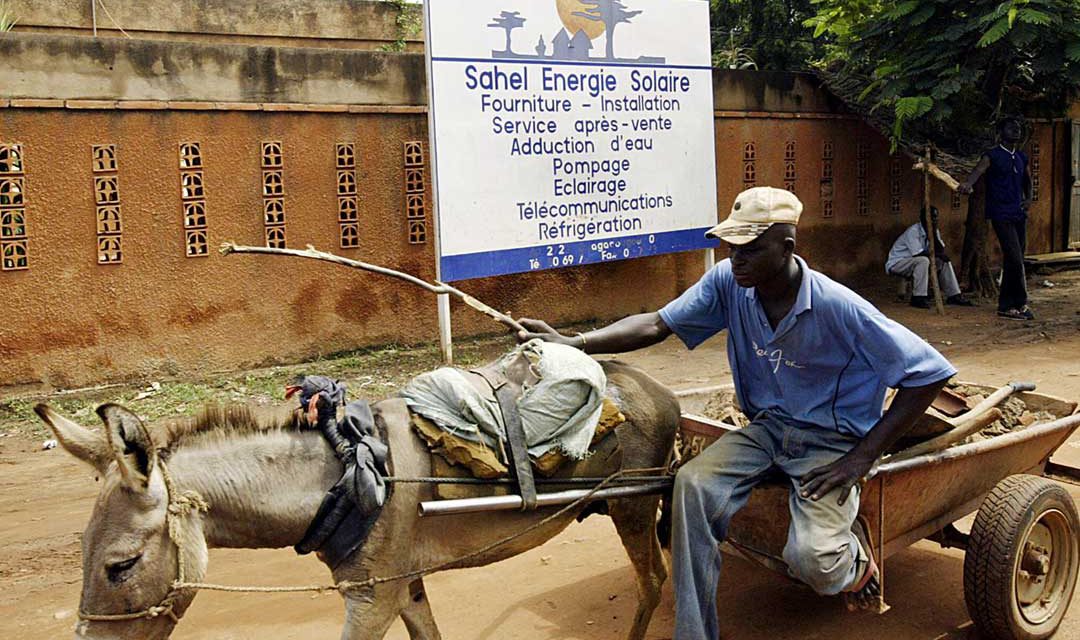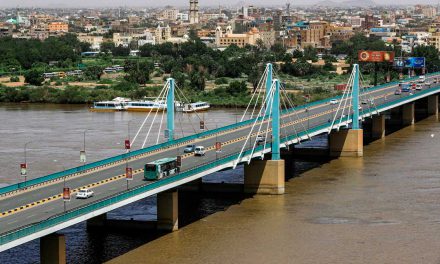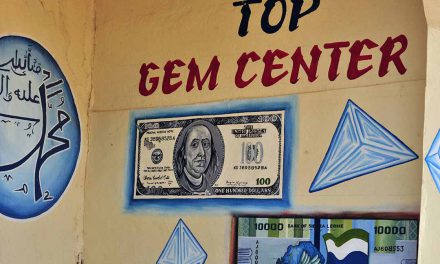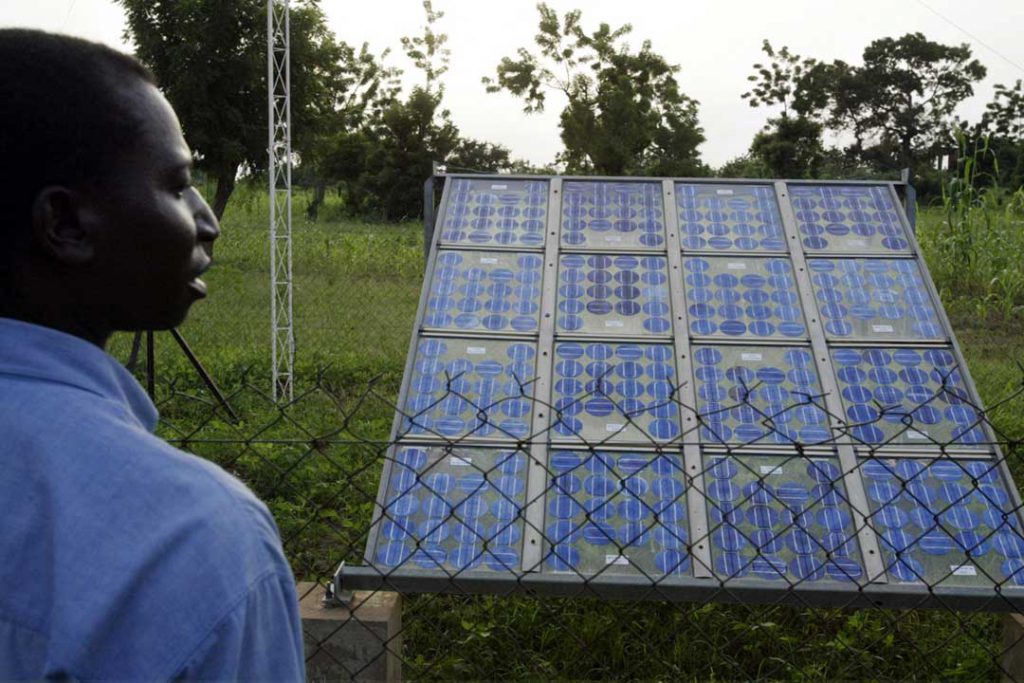
A resident looks at a solar panel 11 September 2004 in Tanghin Dassouri, near Ouagadougou. Solar panels perched on the roof of the Tanghin Dassouri’s medical clinic have lit two decades of births and deaths for the 60,000 people in this cluster of villages just outside of Ouagadougou. AFP PHOTO ISSOUF SANOGO
Nigeria’s example points to the competitive disadvantages a country faces when energy projects are insufficiently resourced and abundant green energy sources are not fully tapped
There is mounting evidence that climate change will profoundly shape the future of societies and livelihoods. Reflecting this reality, efforts are proliferating globally to curtail carbon emissions and limit the average increase in global mean temperature to not more than 2°C. Major agreements have been reached such as the 2016 Paris Climate Agreement, while climate-finance mechanisms such as the Green Climate Fund are also multiplying.
To achieve climate targets, the world needs to move away from hydrocarbons, which are unsustainable for the environment, while upscaling renewables in the overall energy mix. Globally, renewables represented 19.3% of global final energy consumption in 2015 after a period of rapid, sustained growth in capacity and production, according to the Renewable Energy Policy Network for the 21st century (REN21).
As pressure mounts to address climate change and reach Sustainable Development Goal (SDG) number seven on sustainable energy, better-targeted policy interventions will be needed to help Nigeria and west Africa fully harness their abundant solar, hydro, wind and other renewable energy resources. The region possesses abundant renewable energy and could therefore benefit from the economic efficiencies offered by green energy.
The move to green energy offers both opportunity and challenges for Nigeria and the wider west African region. Opportunities exist to advance the progress made thus far towards adopting greener, more efficient energy solutions. However, the region also faces long-standing difficulties in developing reliable and affordable energy supplies for millions of citizens.
The entire west African region could benefit from sustainable energy, which could significantly augment underperforming national electricity grids. Nigeria, for example, relies on gas for about three quarters of its grid-generated power. The country reached a record electricity output of 7,000 MW in August 2017. Of this, only 4,000 MW actually reached final consumers due to systemic challenges with the dilapidated grid infrastructure.
Constraints such as this do not only affect domestic electricity users in Nigeria; they also impact on the country’s promising private sector, which could drive Nigeria’s ambitious national plan to become one of the wold’s top 20 economies by 2020.
Developments in Nigeria illustrate the exciting possibilities of a green-energy transition. Private companies can now supply up to 1 MW of power to paying customers without having to obtain a power generation licence. Similarly, the Association of Alternative Power Suppliers of Nigeria is marshalling resources to support a 10,000 MW project funded by 10,000 Nigerian individual investors, each of whom is expected to generate 1 MW of electricity, according to national tabloid Business Day.
In 2017, a partnership between the Nigerian government and a private-sector firm, Azuri Technologies, was due to complete the first phase of a solar-power project designed for 20,000 homes. About 500 petrol stations across Nigeria have leveraged solar to ensure stable electricity. Rapid technological transitions are aiding this shift. Battery pack costs were down to less than $230 per kilowatt hour in 2016, compared with almost $1,000 per kilowatt hour in 2010. Regulatory changes, such as the unveiling of the Mini Grid Regulation by the Nigerian Energy Regulatory Commission, have also incentivised renewables.
Since 2015, manufacturing firms in the central Ikeja district in Lagos have launched six embedded-power projects of between 30-50 MW. Under the Nigeria-Germany Energy Partnership Project signed in 2016, about 40 federal universities will soon jettison the national grid in favour of a solar supply. Universities such as Benin and Port Harcourt already produce 100% self-generated power based on clean energy. Banks, universities and even residential estates are similarly developing solar and gas-fired projects.
This will aid a move from costly, diesel-fired electricity to renewables. However, Nigerian energy planners urgently need to prevent damaging fragmentation of the sector, as evolving renewable energy projects remain poorly coordinated with the conventional-energy focused national grid. A more concerted focus on renewables also needs to be coupled to a regional orientation in energy planning so as to create greater energy efficiencies and scale across the broader west Africa region.
West Africa’s experience as a whole is similarly instructive, with the mostly inadequate electricity grids rapidly outpaced by a fast-expanding population and economic growth. Energy demand across the region has spiked even as national electricity outputs have reached a plateau. Only 126.2 million of the 300.7 million citizens of the Economic Community of West African States (ECOWAS) enjoy access to electricity. Over 57% of ECOWAS citizens are thus excluded from access to modern energy, according to the African Development Bank.
Six of the most advanced ECOWAS countries provide electricity to about half of their populations, while an average of only 16% citizens in the region have access to electricity – despite the fact that it is endowed with vast renewable energy potential. Increased adoption of renewables will improve citizens’ access to cleaner, more affordable energy, decrease their dependence on traditional biomass and promote a more reliable energy supply. These factors will contribute to more rapid progress towards attaining climate and sustainable energy goals.
In fact, more focus on innovative energy solutions will, over time, likely boost regional economic advantages. Nigeria’s example points to the competitive disadvantages a country faces when energy projects are insufficiently resourced and abundant green-energy sources are not fully tapped. As the country takes tentative steps towards innovative energy options these are likely to prove more competitive as against conventional alternatives. Renewables have the potential to resolve long-standing challenges in the Nigerian energy supply chain, which has met only a fraction of the estimated 20,000 MW the country needs.To fully benefit from a low-carbon transition, west Africa’s energy governance must also become more coherent. Steps should be taken to prevent renewable projects becoming isolated, with unsustainable clusters uncoupled from national grids and regional plans.
Developing regions, including west Africa, should also upscale their green ambitions as countries globally are obliged to shoulder common but differentiated responsibilities for decarbonising energy systems. Renewables help in reducing greenhouse gases and the progressive phasing out of fossil fuels. However, this demands holistic efforts towards social, economic and environmental sustainability. With rapid technological advances, vistas have opened for reducing the region’s dependence on fossil fuels.
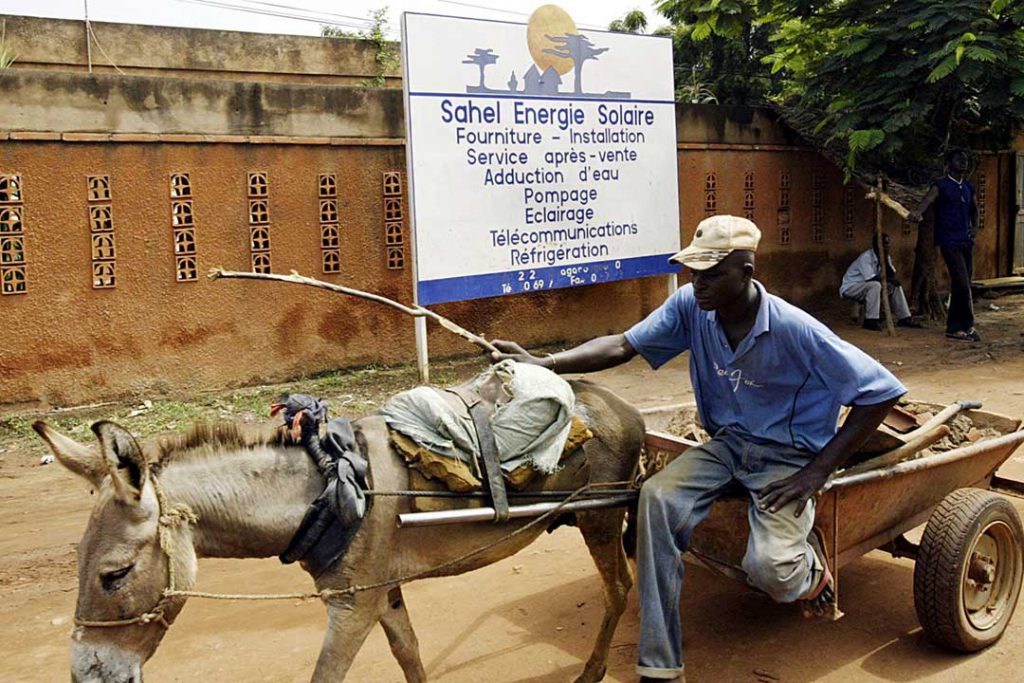
A resident leads his donkey past a solar panel company in Tanghin Dassouri, near Ouagadougou. Solar panels perched on the roof of the Tanghin Dassouri’s medical clinic have lit two decades of births and deaths for the 60,000 people in this cluster of villages just outside of Ouagadougou. AFP PHOTO ISSOUF SANOGO
This will help to reshape the nature of production, societies and consumption patterns. Within the sub-region, governments must focus on proven approaches, while at the same time mobilising resources that tap carbon-neutral energy sources. This will be key for west African states to successfully mitigate climate change.
Simultaneously, west African governments should seek to use the energy shift to enhance the overall quality of life of their citizens, while leveraging opportunities to bolster national economic competitiveness. Focusing on policies that promote broader resilience beyond the energy sector must be one of the key steps in west Africa’s green energy transition.
Energy governance also needs to become better aligned with broader policy areas, including regional integration efforts, so as to foster efficient governance structures and leverage economies of scale, both nationally and regionally. This will help to ensure accountability in the management of energy resources, encourage capacity sharing and also help to frame engagement with business, communities and other stakeholders in society.
Benefits from sustainable-energy investments need to be more inclusively defined and better articulated if they are to secure popular buy-in. It’s only in this way that stakeholders will be able to align behind effective implementation efforts that harness the capacities of citizens and optimise available resources across the whole regional context. It is important that concerted efforts are made to harmonise niche low-carbon projects into more holistic and coherent national and regional plans that are able to transform the region’s energy profiles and bolster overall sustainability.
Moreover, evidence-led policy development and pragmatic implementation are key prerequisites for achieving a more sustainable energy future. West Africa has yet to see the necessary alignment between research and energy policies, and between available resources and the particular programmes designed to improve energy efficiency across the region. This impedes synergies between energy policies and economic-sustainability plans, and undercuts the benefits of scale that a more holistic approach would bring.
For the region to achieve its green ambition, it must transcend the present practice of formulating ambitious plans and programmes with little investment in integrated implementation across all social, economic and other sectors. Moreover, west African countries need to take greater ownership of their own sustainability agenda, evolving holistic climate responses and devising energy plans that take advantage of local technologies and global market dynamics.
Finally, for the region as a whole, the emerging evidence on so-called “stranded” hydrocarbon assets holds important lessons on the urgency of leveraging hydrocarbon assets while they are still valuable to build a bridge to a greener, more sustainable future. Several regional economies remain dependent on conventional energy assets.
The carbon contained in global fossil fuel reserves is estimated to represent about 11,000 Gt of carbon dioxide (CO2), according to a 2015 article on “unburnable fossil-fuel reserves” in Nature. Yet, limiting CO2 emissions to 2°C requires that not more than 1,240 giga-tonnes of these reserves are released between 2011 and 2050, according to the same source. Experts have estimated that roughly 30%, 50% and 80% respectively of oil, gas and coal may become stranded assets as a result of efforts to limit carbon emissions.
This suggests that African and global conventional-energy producers have a limited window in which to leverage revenues from fossil fuels to drive renewable investments, underlining the need for accelerated efforts to green regional energy supplies and the economy. Nigeria and other west African states must, as part of efforts to build wider resilience, prioritise sustainable energy investments and use technologies that are both robust and adapted to African conditions. As regional countries innovate, they must be properly prepared to access global green energy and climate funds and support from global technological partnerships.
Building wider partnerships will bolster progress towards sustainable energy, with scaled-up investments also taking advantage of local know-how to drive irreversible green progress. Crucially, this also depends on the ability to engage in granular analysis of the type in which African governments are slow to invest. This includes mapping renewable energy needs along the rural-urban divide and large-scale versus small users; disaggregating data on geographic distribution of wind, solar, hydro and other resources; and profiling frequency and reliability.
Though the gradual adoption of clean energy has been encouraging, policy fragmentation in Nigeria and its west African neighbours, and a dearth of large-scale green investments, constitute key stumbling blocks. Attracting resources and expertise into Africa’s green transition requires changes in prioritisation and governance on many levels. West African countries can learn much from the successful introduction of policies to incentivise large-scale renewable power producers elsewhere on the continent such as in South Africa.
Dr Julia Bello-Schünemann is a multilingual research consultant. She is versed in integrated forecasting across sectors (including demographics, infrastructure, economics, conflict and violence, etc.), trend and risk analysis, data analysis, policy advice for governments and international organisations. Her expertise straddles Africa, Latin America, the Caribbean, and the European Union. She possesses vast experience in project management, fundraising, strategic planning, multi-stakeholder consultations, training and facilitation. She is currently an Associate Senior Research Consultant with Good Governance Africa-Nigeria. She holds a PhD in International Relations from the Complutense University Madrid, Spain and an MA in Communication, Political Science and Economics from Ludwig-Maximilians-University, Munich in Germany.

